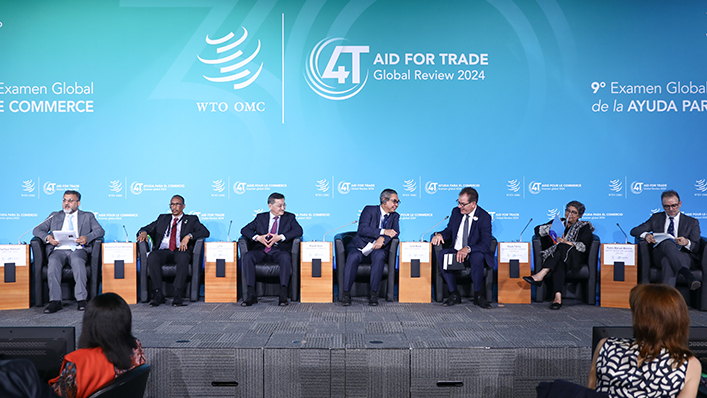
Warsama Dirieh Mohamed, Minister of Trade and Tourism of Djibouti, said: “It is undeniable that LDCs have significant potential in all fields to cement their development. All the same, despite the natural wealth in LDCs, we can observe a sad reality which is illustrated by the following data: 14% of the global population, 1.3% of global GDP, and less than 1% of goods exports.”
“In this context of crises, our objective must be to together find ways to increase the intensity of action in favour of LDC trade by strengthening international and multilateral cooperation,” the Minister said. He cited in particular the need for WTO members to make special and differential treatment effective and efficient for the implementation of the Trade Facilitation Agreement by providing assistance and strengthening capacities as provided for by the Agreement.
China’s Vice Minister of Commerce Li Fei said that while LDCs are the most vulnerable group in the world, “they are also the group with the greatest growth potential,” something the Aid for Trade initiative is intended to facilitate. He outlined various initiatives China has taken to assist LDCs, including being one of the first developing members to provide LDCs with duty free import treatment.
“China’s development story fully shows trade is a main engine of growth and that opening up brings progress,” he said. “Involving the WTO will create more development opportunities for developing members.”
Gerd Müller, Director-General of the UN Industrial Development Organization, said the steps needed include increased investment in critical infrastructure in sectors such as transportation, digital connectivity, agribusiness, infrastructure, and investments in processing industries.
Africa’s population alone will double within the next 30 years, he noted. “Its population needs not millions, they need hundreds of millions of new jobs. They need an answer, an investment offensive.”
Rabab Fatima, UN Under Secretary-General and High Representative for LDCs, Landlocked Developing Countries and Small Island Developing States, said there were “huge untapped potentials of South-South trade,” which can boost the trade of LDCs overall.
“By promoting a more inclusive, interconnected and resilient international trade framework, the benefits extend universally, benefiting people and communities worldwide,” she added.
Pedro Manuel Moreno, Deputy Secretary-General with UN Trade and Development, argued that the usual development approaches have failed to address the challenges LDCs face in boosting their small share of global trade.
“We need a new generation of development policies that focus on building up low-value added manufacturing towards higher skilled, higher technological manufacturing and services,” he said. “This requires a shift away from a commodity driven development model and a focus on building national productive capacities. Productive capacities lie at the heart of any economic transformation.”
A policy note issued by the WTO Secretariat examines the role of trade in realizing the socio-economic development ambitions of LDCs by focusing on three specific topics: services, green transition and regional integration.
The policy note, “LDC Trade Priorities – Looking Forward”, is available here.
Share
Reach us to explore global export and import deals